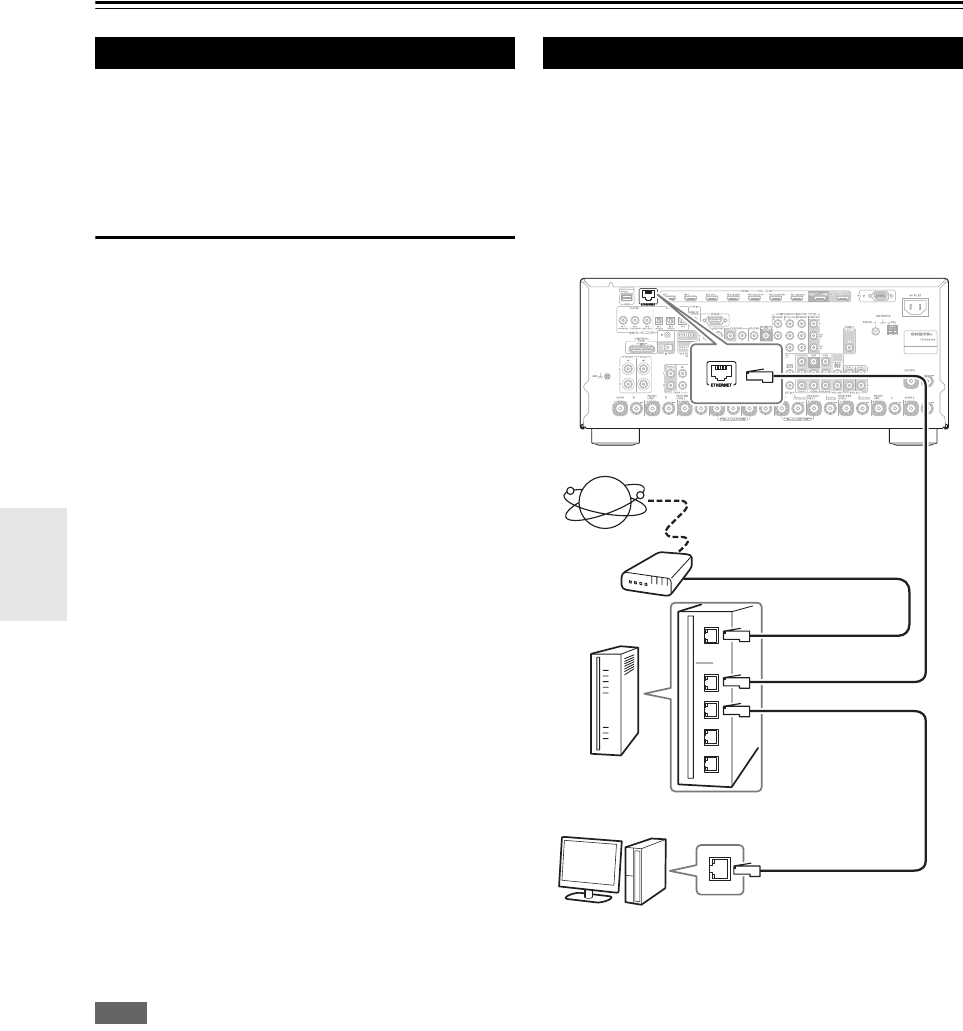
70
En
NET/USB
The AV receiver is network-ready, which means you can
hook it up to your home network with a standard Ethernet
cable and enjoy the music files stored on your computer or
media server. If your network is connected to the Internet,
you can also enjoy Internet radio.
Network Requirements
■ Ethernet Network
For best results, a 100Base-TX switched Ethernet network
is recommended. Although it’s possible to play music on a
computer that’s connected to the network wirelessly, play-
back may be unreliable, so wired connections are recom-
mended.
■ Ethernet Router
A router manages the network, routing data and supplying
IP addresses. Your router must support the following:
• NAT (Network Address Translation). NAT allows sev-
eral networked computers to access the Internet simulta-
neously via a single Internet connection. The AV
receiver needs Internet access for Internet radio.
• DHCP (Dynamic Host Configuration Protocol). DHCP
supplies IP addresses to network devices, allowing them
to configure themselves automatically.
• A router with a 100Base-TX switch built-in is recom-
mended.
Some routers have a modem built-in, and some ISPs
require you to use specific routers. Please consult your ISP
or computer dealer if you’re unsure.
■ CAT5 Ethernet cable
Use a shielded CAT5 Ethernet cable (straight-type) to con-
nect the AV receiver to your home network.
■ Internet Access (for Internet radio)
To receive Internet radio, your Ethernet network must
have Internet access. A narrowband Internet connection
(e.g., 56K modem, ISDN) will not provide satisfactory
results, so a broadband connection is strongly recom-
mended (e.g., cable modem, xDSL modem, etc). Please
consult your ISP or computer dealer if you’re unsure.
Note
• To receive Internet radio with the AV receiver, your broadband
Internet connection must be working and able to access the Web.
Consult your ISP if you have any problems with your Internet
connection.
• The AV receiver uses DHCP to configure its network settings
automatically. If you want to configure these settings manually,
see “Network Settings” (➔ 76).
• The AV receiver does not support PPPoE settings, so if you have
a PPPoE-type Internet connection, you must use a PPPoE-com-
patible router.
• Depending on your ISP, you may need to specify a proxy server
to use Internet radio. If your computer is configured to use a
proxy server, use the same settings for the AV receiver (➔ 76).
To connect the AV receiver to your home network, plug
one end of a shielded CAT5 Ethernet cable into the AV
receiver’s ETHERNET port, and plug the other end into a
LAN port on your router or switch.
The following diagram shows how you can connect the
AV receiver to your home network. In this example, it’s
connected to a LAN port on a router, which has a 4-port
100Base-TX switch built-in.
About NET Connecting the AV Receiver
Internet radio
Modem
Router
Computer or media server
LAN/Ethernet port
WAN port
LAN port
LAN port


















